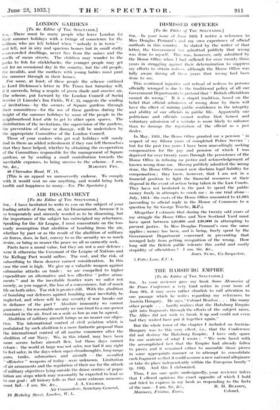AIR DISARMAMENT
[To the Editor of THE SPECTATOR.] SIR,--I have hesitated to write to you on the subject of your leading article of June 9th, on Air Disarmament, because it is so temperately and sincerely worded as to be disarming, but the importance of the subject has outweighed my reluctance. Speaking for the Air League, I must concentrate on the too- ready assumption that abolition of bombing from the air, whether by pact or as the result of the abolition of military air forces, does, in fact, convey to us the security we so much desire, or bring us nearer the peace we all so earnestly seek.
Pacts have a moral value, but they are not a sure defence : were it otherwise the Covenant of the League of Nations and the Kellogg Pact would suffice. The cost, and the risk, of subscribing to them deserve earnest consideration. In this ease the cost is high. We give up a valuable weapon against submarine attacks on trade ; we are compelled to higher expenditure on alternative and less effective police arma- ments " and in the inevitable frontier wars we stiffer not merely, as you suggest, the loss of a convenience, but of much life on both sides. The risk is greater still. With the abolition of bombing our defences against bombing nnist inevitably be neglected, and where will be any security if war breaks out in defiance of the pact ? Absolute immunity we cannot guarantee ; for:reasonable security we can trust to a one-power standard in the air, fixed on a scale as low as can be agreed.
Abolition of military aircraft brings us no nearer our objec- tive; The international control of civil aviation which is postulated by such abolition is a more fantastic proposal than the international control of all marine commerce after the abolition of our Navy. We, in this island, may have been more secure before aircraft flew, but those days cannot return : the world at large was not safer, nor had it any right to feel safer, in the days when super-dreadnoughts, long-range guns, tanks, submarines and aircraft -- the so-called offensive " weapons of today—were unknown. Limitation of air armaments and the regulation of their use for the attack of military objectives lying outside the dense centres of popu- lation are steps which may reasonably be expected to lead us to our goal : all history tells us that more extreme measures
must fail.—I am, Sir, &c., .I. A. CHANTER,
Air Commodore, Secretary-General.
19 Berkeley Street, London, 117.1.








































 Previous page
Previous page